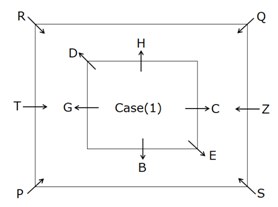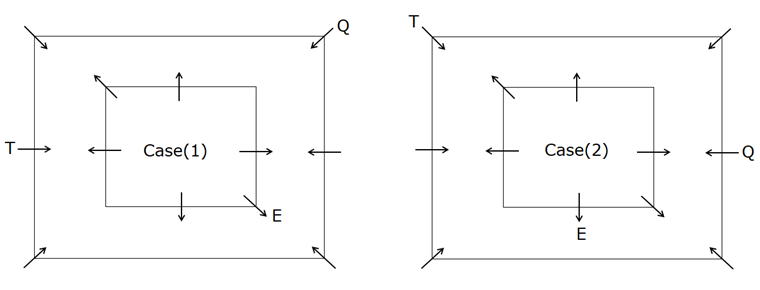Dear Aspirants, Our IBPS Guide team is providing new series of Reasoning Questions for IBPS Clerk Mains 2022 so the aspirants can practice it on a daily basis. These questions are framed by our skilled experts after understanding your needs thoroughly. Aspirants can practice these new series questions daily to familiarize with the exact exam pattern and make your preparation effective.
Direction (1-5): Study the following information carefully and answer the below questions
Twelve persons – A, B, C, D, E, F, G, H, I, J, K, and L are sitting in the two concentric square tables. Four of them are sitting in the corner of the inner table facing outside and the rest of eight are sitting at the outer table facing the centre. On the outer table, four of them are sitting in the corner and four of them are sitting in the middle of the side of the table. All the information is not necessarily in the same order.
D sits third to the left of I. One person sits between D and J. The one who sits second to the right of J is facing H who is facing outside the centre. K neither sits adjacent to I nor J but sits at the outer table. The one who sits immediate right of K faces C. The number of persons seated between K and I is the same as between K and A. F sits third to the right of the one who sits adjacent to K. The one who faces L sits second to the right of G. The number of persons seated between G and B is same as between B and the one who faces E. B sits at the outer table and is neither sit adjacent to K nor J.
1) If E and B interchanged their positions in the same way I and H interchanged their positions, then who among the following persons are second to the right of the one who faces I?
A.The one who sits second to the right of E
B.The one who sits second to the left of K
C.F
D.The one who sits immediate left of H
E.The one who sits immediate right of A
2) How many persons are sitting between K and the one who faces L when counted to the right of K?
A.None
B.One
C.Two
D.Three
E.Four
3) Which among the following statement(s) is/are true?
I)E and L are immediate neighbors
II)H faces D.
III) B sits third to the left of D
A.Only I and III
B.Only III
C.Only I and II
D.Only II
E.None of these
4) What is the position of the one who faces E with respect to I?
A.Second to the left
B.Second to the right
C.Fourth to the left
D.Third to the right
E.Immediate right
5) Who among the following person sits second to the right of A?
A.F
B.The one who sits immediate left of I
C.K
D.The one who sits second to the left of G
E.None of these
Direction (6-10): Study the following information carefully and answer the below questions.
Twelve persons are sitting around two concentric square tables as shown in the below figure in such a way that B, C, D, E, G, and H are sitting in the inner square table whereas P, Q, R, S, T, and Z are sitting in the outer square table. All the information is not necessary in the same order.

A person facing T sits second to the right of E. Two persons are sitting between T and a person sitting to the immediate left of Q. One person sits between G and H, neither of them sitting adjacent to E. A person facing G sits immediate right of R. The number of persons sitting between B and D is the same as the number of persons sitting between P and Z, who sit at the middle of the side. D doesn’t sit adjacent to E. C doesn’t sit adjacent to G. A person sitting adjacent to B sits facing S.
6) How many persons are sitting between G and E when counted to the left of E?
A.As many persons are sitting between Q and T when counted to the right of T.
B.One
C.As many persons are sitting between H and the one who sits facing Z.
D.Either A or C
E.None of these
7) Four of the five are related to each other in a certain way and thus form a group, find the odd one out?
A.GT
B.SE
C.RD
D.BP
E.CZ
8) Who among the following person sits second to the right of H?
A.B
B.The one who sits second to the left of the person who is facing T
C.G
D.The one who sits facing R.
E.None of these
9) Which of the following statement is/are true?
A.G sits second to the left of H
B.Two persons are sitting between B and the person facing T.
C.E sits immediate right of C.
D.More than one statements are true
E.None are true
10) What is the position of P with respect to R?
A.Second to the left
B.Immediate right
C.Immediate left
D.Second to the right
E.None of these
Answers :
Directions (1-5) :

We have,
- D sits third to the left of I.
- One person sits between D and J.
- The one who sits second to the right of J is facing H who is facing outside the centre.
From the above condition, there are two possibilities.

Again we have,
- K neither sits adjacent to I nor J but sits at the outer table.
- The one who sits immediate right of K faces C.
From the above condition, there are three possibilities.

Again we have,
- The number of persons seated between K and I is the same as between K and A.
From the above condition, case1 gets eliminated.

Again we have,
- F sits third to the right of the one who sits adjacent to K.
- The one who faces L sits second to the right of G.
- The number of persons seated between G and B is the same as between B and the one who faces E.
- B sits at the outer table and neither sits adjacent to K nor J.
From the above condition, case1a gets eliminated. case2 shows the final arrangement.

1) Answer: D
2) Answer: C
3) Answer: C
4) Answer: D
5) Answer: C
Directions (6-10) :

We have:
- A person facing T sits second to the right of E.
That means, in case (1) T sits at the edge, in case (2) T sits at the corner.
- Two persons are sitting between T and a person sitting to the immediate left of Q.
That means, T sits second to the right of Q.
Based on the above given information we have:

Again, we have:
- One person sits between G and H, neither of them sitting adjacent to E.
- A person facing G sits immediate right of R.
That means, in case (1) & case (2a) R sits immediate left of T, in case (2b) R sits immediate left of Q.
Based on the above given information we have:

Again, we have:
- The number of persons sitting between B and D is the same as the number of persons sitting between P and Z, who sit at the middle of the side.
- D doesn’t sit adjacent to E.
- C doesn’t sit adjacent to G.
- A person sitting adjacent to B sits facing S.
That means, in case (1) B sits immediate left of G, case (2a) & case (2b) are not valid.
Based on the above given information we have the final arrangement as follows:

Case (2a) & case (2b) are not valid as A person sitting adjacent to B sits facing S.
6) Answer: A
7) Answer: D
8) Answer: B
9) Answer: D
10) Answer: D





